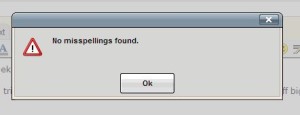 Words can hurt us, as scientists have discovered.
Words can hurt us, as scientists have discovered.
That old children’s nursery rhyme “Sticks and Stones” tells a lie.
From the brain’s perspective, social pain and pleasure is very similar to physical pain and pleasure. The brain uses similar circuits for both pain and pleasure. (See my blog post What’s your tolerance for pain at work? for more information.)
Even though Dr. Matthew Lieberman and Dr. Naomi Eisenberger published the findings of their trailblazing research six years ago, hurtful words and phrases still run wild everywhere, including the work place.
Name calling, bullying and other forms of verbal abuse are the worst.
Making statements in a negative way is not as extreme but it is insidious.
What are the cumulative effects on our brain and psyche? I’ve not seen any specific research results but the constant spikes in cortisol–the stress hormone–can’t be good. Or, for many, it may be constantly elevated levels, feeling like experiencing Chinese water torture.
Consider the email program that I’ve been using for one of my special projects. (It will remain anonymous to protect the guilty.)
Whenever I write an email message that sails through spell check perfectly, I get a pop-up message in red that tells me “No misspellings found.”
Why couldn’t the message be “Congratulations! Your spelling is 100% perfect!” in some cheerful color like green or purple?
Making this change would not be white washing or sugar coating in my book.
Instead, it would be a nicety in our VUCA world that seems to becoming a ruder, rougher more inconsiderate place all the time.
The act of being positive recognizes the good behavior you observe in others and encourages the individuals to keep it up. It’s a great reinforcement.
So the next time you get ready to share “nattering nabobs of negativism,” stop and think about how to turn the bad into good.
For example, try “That’s great!” instead of “That’s not bad.” Or “Thanks for the effort.” instead of “I would have done it a different way.” Or, “You did a great job.” instead of “You did it better than I thought you would.”
Positioning things positively is not being an old-fashioned Pollyanna; it’s being a modern-day individual who observes the latest in scientific research.
And if you want some help in seeing the bright side, consider taking a session of “Tiny Habits for Work” with me. Many of the participants work on creating habits that put them in a positive frame of mind. The next session starts June 23 with sign up by Friday, June 20. You can learn three new good work habits in five days. For more information, check out www.tinyhabits.com, which is the brainchild of Dr. BJ Fogg, for general information. You can register at http://bit.ly/regTinyHabits4work623
How well can you find the pony in the pile of manure and be positive about it?

0 Comments